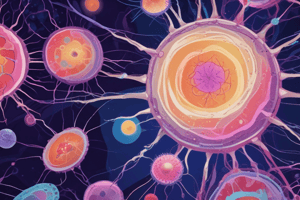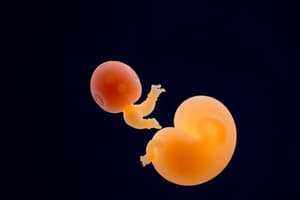Podcast
Questions and Answers
Primordial germ cells derive from the hypoblast during gastrulation.
Primordial germ cells derive from the hypoblast during gastrulation.
False (B)
Gastrulation is characterized by the formation of three germ layers.
Gastrulation is characterized by the formation of three germ layers.
True (A)
The embryo changes from a bilaminar to a tridimensional morphology during the end of gastrulation.
The embryo changes from a bilaminar to a tridimensional morphology during the end of gastrulation.
True (A)
Nervous system structures begin forming during the initial stages of gastrulation.
Nervous system structures begin forming during the initial stages of gastrulation.
The process of gastrulation begins immediately after birth.
The process of gastrulation begins immediately after birth.
The trilaminar embryo is initially bidimensional during the first week of gastrulation.
The trilaminar embryo is initially bidimensional during the first week of gastrulation.
Both the eyes and ears begin forming from the paraxial mesoderm.
Both the eyes and ears begin forming from the paraxial mesoderm.
Gastrulation is considered the most critical period in life by embryologists.
Gastrulation is considered the most critical period in life by embryologists.
The neural ectoderm proliferates under the induction of the notochord.
The neural ectoderm proliferates under the induction of the notochord.
The middle portion of the neural ectoderm forms the brain.
The middle portion of the neural ectoderm forms the brain.
The intermediate mesoderm gives rise to the somites.
The intermediate mesoderm gives rise to the somites.
Ventral folding of the embryo occurs before the end of the 3rd week of development.
Ventral folding of the embryo occurs before the end of the 3rd week of development.
During gastrulation, the embryo undergoes significant cranial proliferation.
During gastrulation, the embryo undergoes significant cranial proliferation.
The lateral mesoderm differentiates into dorsal and ventral portions.
The lateral mesoderm differentiates into dorsal and ventral portions.
The neural tube forms from the fusion of neural folds.
The neural tube forms from the fusion of neural folds.
The ventral closure of the embryo occurs after the 28th day of development.
The ventral closure of the embryo occurs after the 28th day of development.
Gastrulation begins with the formation of the primitive streak.
Gastrulation begins with the formation of the primitive streak.
The mesoderm is responsible for forming the entire nervous system.
The mesoderm is responsible for forming the entire nervous system.
Neural crest cells are derived from the mesoderm.
Neural crest cells are derived from the mesoderm.
Extraembryonic mesoderm contributes to the formation of all tissues in the developing embryo.
Extraembryonic mesoderm contributes to the formation of all tissues in the developing embryo.
The endoderm gives rise to structures such as the gut and lungs.
The endoderm gives rise to structures such as the gut and lungs.
All cells of the developing embryo originate from the epiblast.
All cells of the developing embryo originate from the epiblast.
Neural crest cells have a more limited differentiation potential than cells from the germ layers.
Neural crest cells have a more limited differentiation potential than cells from the germ layers.
Primordial germ cells originate from the ectoderm.
Primordial germ cells originate from the ectoderm.
Flashcards
Gastrulation
Gastrulation
The process during which the three germ layers (ectoderm, mesoderm, and endoderm) are formed from the epiblast.
Primitive Streak
Primitive Streak
A structure that forms during gastrulation, acting as an organizing center for the developing embryo.
Ectoderm
Ectoderm
The outermost germ layer, giving rise to tissues like skin, nervous system, and some glands.
Mesoderm
Mesoderm
Signup and view all the flashcards
Endoderm
Endoderm
Signup and view all the flashcards
Neural Crest Cells
Neural Crest Cells
Signup and view all the flashcards
Primordial Germ Cells
Primordial Germ Cells
Signup and view all the flashcards
Extraembryonic Mesoderm
Extraembryonic Mesoderm
Signup and view all the flashcards
Fetal Morphology
Fetal Morphology
Signup and view all the flashcards
Neural Tube Formation
Neural Tube Formation
Signup and view all the flashcards
Primordial Germ Cells (PGCs)
Primordial Germ Cells (PGCs)
Signup and view all the flashcards
Segmentation
Segmentation
Signup and view all the flashcards
Spinal Cord Formation
Spinal Cord Formation
Signup and view all the flashcards
Brain Formation
Brain Formation
Signup and view all the flashcards
Mesoderm Differentiation
Mesoderm Differentiation
Signup and view all the flashcards
Somite Formation
Somite Formation
Signup and view all the flashcards
Lateral Mesoderm Subdivision
Lateral Mesoderm Subdivision
Signup and view all the flashcards
Embryonic Folding
Embryonic Folding
Signup and view all the flashcards
Fetal Position
Fetal Position
Signup and view all the flashcards
Study Notes
Embryology and Stem Cell in Reproduction
- Initially, development focuses on the first two weeks, which are crucial for both morphological growth and ethical considerations.
- Embryology's foundations date back to ancient Greek times, including Aristotle's theories. The field became a true biological discipline with the advent of microscopes in the mid-17th century.
- Birth defects are a leading cause of infant mortality and significantly impact morbidity, affecting both physical and mental health. The incidence rate is 6/100 births.
- Birth defects are broadly categorized into malformations and deformations.
- Malformations arise from errors in cell specification during differentiation.
- Deformations are caused by issues in organogenesis and morphogenesis.
- Understanding developmental mechanisms is vital in preventing birth defects, as well as reducing related costs.
- Most women don't realize they are pregnant until the second month of pregnancy.
- The embryonic stage (weeks 3-8) is highly sensitive to environmental factors and, hence, prone to birth defects.
Main Steps of Embryology
- Microscopes allowed the observation of spermatozoa within seminal fluid, which led to the understanding of fertilization.
- Cell theory, introduced in the mid-1800s, was a critical step in understanding the fundamental role of cells in development.
- Advances in molecular biology, particularly in the last 15 years, has offered insight into the mechanisms driving embryonic development.
Studying That Suits You
Use AI to generate personalized quizzes and flashcards to suit your learning preferences.





